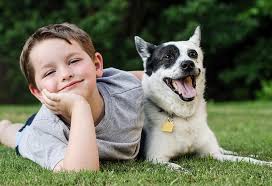
As much as we love our pets, we also view human life as being in a special category. Is this always the case? Or do we gradually learn to think this way?
Matti Wilks, a post doc in the Mind and Development Lab at Yale, is lead author on a recent study that asks how children value animal versus human lives. Children between the ages of 5 to 9 years and adults were given a variety of choices about saving x number of animals versus one human life, and the answers they provided were quite different. The respondents were also given the option to say “I don’t know.”
The children were more likely than the adults to save animals rather than humans, even when that animal was a pig, which many view as food. Seventy percent of the children, compared to 40% of the adults, were willing to let a person die to save 100 dogs. Ninety-three percent of the adults chose to save one person over one pig (one wonders what the 3% who chose to save the pig are like), but only 57% of the children made this choice.
Children and adults responded similarly to questions about the relative intelligence and ability to experience pain, sadness, and fear of humans, dogs, and pigs, so these beliefs did not influence their differences in moral judgments.
The authors concluded that human “specialness” is not something we are born with, nor does it appear early in childhood. The nine-year-olds gave the same responses as the five-year-olds. The authors suggest that somewhere in adolescence, young people internalize the societal views about the higher value of human life.
The population sampled for this study were from the U.S., and it is very likely that different results might be found with a wider, more global sample. However, the underlying principle about social learning and the value of life is likely to be reasonably universal.
Now, about those 3% who would save a pig over a human…..we need more research to figure out what’s happening here.


0 Comments